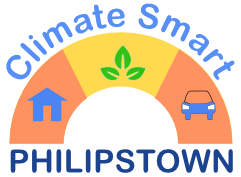Apr 6, 2021 Putnam County News and Recorder
By Krystal Ford - Climate Smart Coordinator
Is Your Back Yard Climate-Friendly?
It’s spring – the days are warmer, birds chirping, and buds appearing, it’s also the perfect time of year to rethink lawn care.

That traditional lush turf might look nice, but it’s actually harmful for the environment and our health. Conventional lawn care with fertilizer, pesticides, and gas-powered equipment eliminates natural habitats, pollutes the environment, and adds carbon emissions. A study by the University of California found that manicured lawns create four times more carbon dioxide than the grass can store.
Fortunately, it’s easy to make our yards beautiful and better for our families, wildlife, and the environment. It’s also less expensive and time consuming.
Rethink Green
What if we all learned to love the clover and dandelions? What if the perfect lawn meant you only had to mow every two to three weeks? What if success of a lawn was measured by how much life its feeding? How sustainable is it? Or how much carbon sequestering?
You can make your backyard climate-friendly by applying these five tips.
-
Top dress your lawns with compost, or compost tea to feed the microbes.
-
Don’t use synthetic fertilizers, pesticides or herbicides
-
Mow every two to three weeks
-
Shrink your lawn, and add pollinator plants to feed the birds, butterflies and bees
-
Switch your gas-powered lawn equipment to electric
Rethink Perfect
If you are going to have a lawn, the goal should be to have a healthy green lawn, and not a perfect monoculture that needs large amounts of chemicals and petroleum to be productive. It’s time to stop using synthetic fertilizers, pesticides and herbicides. Pesticides kill beneficial insects like pollinators and also contaminate the soil and kill the microbiome that is integral to our ecosystem (and the soils ability to sequester carbon).
They also end up in our water systems, polluting wells, streams and rivers. One of the biggest contributors to greenhouse gas emissions from lawn care is the use of nitrogen fertilizer. An easy and free alternative is to leave your grass clippings on the lawn. They break down and provide nitrogen. In the fall, mulch mow your leaves instead of blowing them. The leaves decompose and provide the soil with nutrients, and bonus they feed soil microbes that are key to carbon sequestration. If you’re more ambitious, sow clover into the grass. It adds nitrogen to the soil and provides much needed food for the bees.
Mow Less
Reduce your mowing schedule from weekly to every two to three weeks, or let it grow to four inches. Keeping the grass longer encourages growth of root systems making your lawn more resilient to drought and other stressors and keeps the weeds out. Bonus: This saves you time and money!
Think about shrinking your lawn. Are there areas that are hard to mow? The grass doesn’t grow well? That is not in use? Consider letting those sections go wild or planting them with wild flowers and native plants that provide food and habitat for pollinators.
Think Electric
Last but not least, let’s talk lawn equipment. Gas-powered lawn equipment is loud and polluting. Lawnmowers emit ten times more hydrocarbons than a typical car for every hour of operation. That means in one hour, a commercial lawn mower spews as much smog forming pollution as driving a 2017 Camry for 300 miles. Those noisy leaf blowers produce as much carbon in one hour as a car driving for eight hours.
Switch out gas powered mowers, blowers, chainsaws, hedge trimmers, and other yard equipment for electric. Electric equipment is cheaper to operate because it runs on a battery charge, not gasoline, and is easier to maintain because it does not require maintenance like tune-ups and oil or spark plug replacements. While the noise of many gas-powered mowers or blowers can cause hearing damage to the operator, electric equipment is so quiet you can carry on a conversation while using it.
Lawns are a long held cultural norm. We tend to them diligently, and we signal to our neighbors that we are good citizens. We need to shift our practices and perspectives slightly so that we are good citizens to the wider community, that includes our ecosystem. We can reduce our carbon emissions, increase the carbon storage in our soil, and still have beautiful functional outdoor spaces, and we can do it lawn by lawn.



